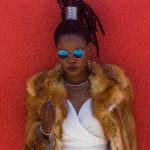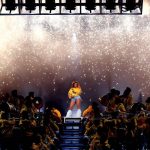Beyoncé divides and unites with her ‘love letter to Africa’
Whether or not you agree with the American pop icon’s statement about her Lion King-inspired album, The Gift is a symbol of ‘an artist at her most potent’.
Author:
24 July 2019

There is something slightly We Are the World-y about Beyoncé describing her latest offering as “a love letter to Africa”. Inspired by this year’s remake of The Lion King, in which she is the voice of Nala as Beyoncé Knowles-Carter, she produced the companion album The Lion King: The Gift.
But if we are to indulge the notion, as Nancy Adimora writes, surely we should be taken through an aural journey of 54 African countries rather than being confined to mostly the sounds of West Africa?
Hannah Giorgis, noting in The Atlantic magazine the absence of “even a single song from an East African artist”, writes: “Given Beyoncé’s proven ability to produce meticulous work, it’s curious that her ‘love letter to Africa’ appears to have left out the region from which The Lion King draws the majority of its visual cues.”
Related article:
At the same time, however, The Gift offers a limited yet self-contained history of the continent’s diverse sounds, catapulted into the present by featuring some of Africa’s most popular musicians of our era. The album strongly features the current brand of Afrobeats as begotten by Fela Kuti.
This form of the genre was inspired by the emergence of the Black Panther Party, Kuti’s interaction with jazz artists in England and the wave of independence that swept the continent. There is something about each track that reaches back into the work of legendary icons from the diaspora and the continent, such as Kuti, Bob Marley, Beenie Man, Miriam Makeba, Salif Keita and Angélique Kidjo.
This is music that has built bridges between black people across borders, brutal history and a punishing present. It is a sound, therefore, with history and connection at its root.
More than world music
The Gift features a number of Africa’s most relevant young artists and genre game-changers alongside a body of work in which Beyoncé is a mainstay. This selection is important to decentre the idea that groups like Ladysmith Black Mambazo are the only sound representative of Africa.
By fusing Afrobeats, highlife and gqom with hip-hop and R&B, it is a sonic entry point into naming African genres rather than simply bundling them up into ambiguous categories such as world music or, more bizarre, African hits.
Taking a page from Black Panther soundtrack executive producer and rapper Kendrick Lamar, the album is conceptual and could be seen as the latest Beyoncé offering, given her centrality to the project. However, interludes of scenes from the film are constant reminders of why this project exists. It is a new, hyperrealistic imagining of The Lion King that triggers warm memories of the original.
Marking our entrance into these memories, the album begins with the voice of Mufasa (James Earl Jones). Earl Jones is the only voice from the original cast and this is enough to evoke feelings of nostalgia in many of the adults who grew up watching the original animation.
What follows are tracks featuring up-and-coming and established African producers, writers and artists such as Anatii, Bubele Boii and Burna Boy in collaboration with Beyoncé, with appearances from Kendrick Lamar, Pharrell Williams, Donald Glover and Jay-Z.
A world of women
If the film were to detail the accurate family dynamics of a pride of lions, lionesses would be the rulers of Pride Rock, Knvul Sheikh writes in The New York Times. This is not the case in the film but Beyoncé’s album feels distinctly matriarchal, centring on the female voice and featuring songs that could be dedications to her daughter Blue Ivy along with others written from a woman’s perspective, such as Bigger, Find Your Way Back, Brown Skin Girl and My Power.
No one could fault Beyoncé for attempting to lift up her daughter, considering the numerous negative comments about Blue Ivy’s appearance and distasteful R Kelly-related joke on Amy Poehler’s Difficult People in 2015.
Related article:
Tiwa Savage on Keys to the Kingdom and My Power featuring Tierra Whack, Yemi Alade, Busiswa and Moonchild Sanelly further entrench the theme of women empowerment, one Beyoncé has championed throughout her career, from Independent Women Part 1 with Destiny’s Child to Run The World (Girls), Flawless and Formation.
The Africa-influenced beats and the inclusion of indigenous languages such as isiZulu, Lingala and Yoruba set Beyoncé up as a bridge between Africa and the diaspora in ways we have not seen in the mainstream since Harry Belafonte and Miriam Makeba sang their duets and Bob Marley’s Zimbabwe set the Jamaican artist up as a global pan African and anti-colonial cultural icon.
The Gift packs less of a political punch, but the fact that Beyoncé is arguably the biggest pop icon of this generation will hopefully open far more doors for African artists than the Black Panther soundtrack.
An artist at her most potent
The Gift is a display of “an artist at her most potent”, to borrow Sandra Oh’s phrase. Beyoncé is simply getting better and better.
Perhaps the mark of a great artist is how they embrace changing trends in music while simultaneously blazing a trail in how we experience new sounds. A significant example is Mariah Carey’s collaboration with Bone Thugs-N-Harmony in which she adopted the group’s style of rapping in her vocals, shifting the way R&B vocals are arranged with one song. Beyoncé does this by incorporating a singing style that ebbs and flows between melody and dialogue.
Beyoncé has this nowadays rare ability to own a song, so to collaborate with her is to sink or swim. One would think a collaboration between South Africa’s gqom and house music kingmakers Busiswa and fellow South African musician Sanelly would leave the South African Music Awards no choice but to make an offering by an American Song of the Year, given the meeting point of remarkable talent from all sides.
Related article:
Durban-born DJ Lag produced My Power featuring Beyoncé, Alade, Busiswa, Sanelly and Whack. But it is one of the more disappointing songs on the album. Busiswa has gone harder in Banomoya and Midnight Starring.However her verse unfortunately falls short of the smart rhymes that litter her sophomore, gqom-heavy album Summer Life.
Sanelly, who also features on South African producer DJ Maphorisa’s Midnight Starring, created more attention-grabbing work with Walk Ye Phara, which is what got Beyoncé’s attention after the Global Citizens Festival in Soweto on 2 December 2018 at which they both performed.
Busiswa and Sanelly don’t quite come together in the way that Wizkid and Beyoncé do on Brown Skin Girl, a collaboration that celebrates medium to deep-toned women, or Shatta Wale and Major Lazer on Already. Had they been given their own song – as were Burna Boy, Tiwa Savage, Mr Eazi and Tekno – perhaps there would have been less pressure? Still, their inclusion on the album is a major win and a deserved career milestone.
Spirit, the last song on the album, is not one of The Gift’s strongest songs. And the video for this song has come under scrutiny online for its similarities to South Africa-raised artist Petite Noir’s visual album La Maison Noir: The Gift and the Curse.
The lead single is no Can You Feel the Love Tonight or A Whole New World, Disney’s strong leading songs from the original The Lion King and Aladdin movies, in terms of strength and timelessness. It is not even as strong as Beyoncé’s Listen for the Dreamgirls movie, despite her obvious vocal growth between 2005 and now. However, considering and experiencing the song as part of a whole rather than a single, it becomes clear that The Gift is a big and beautiful narrative, something that has become a characteristic of Beyoncé’s work.



